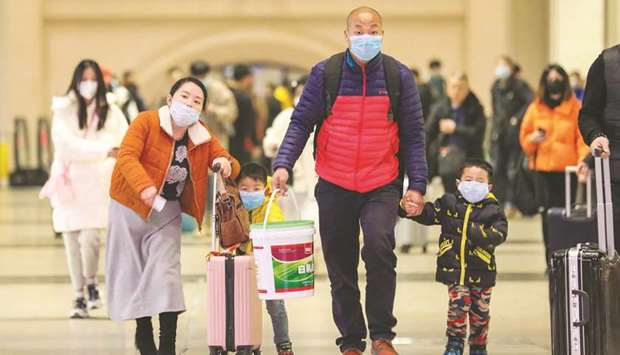Asian countries yesterday ramped up measures to block the spread of a new virus as the death toll in China rose to six and the number of cases surpassed 300, raising concerns in the middle of a major holiday travel rush.
Nations across the Asia Pacific region stepped up checks of passengers at airports to detect the Sars-like coronavirus, which first emerged in the central Chinese city of Wuhan.
Fears of a bigger outbreak rose after a prominent expert from China’s National Health Commission confirmed late Monday that the virus can be passed between people.
Authorities previously said there was no obvious evidence of person-to-person transmission and animals were suspected to be the source, as a seafood market where live animals were sold in Wuhan was identified as the centre of the outbreak.
But the World Health Organisation (WHO), which was concluding a fact-finding mission in Wuhan, was still being cautious, saying at a briefing in Geneva that “not enough is known to draw definitive conclusions about how it is transmitted”.
Spokesman Tarik Jasarevic warned though that “more cases should be expected” both in China and in other countries.
Hundreds of millions of people are criss-crossing China this week in packed buses, trains and planes to celebrate the Lunar New Year with relatives.
More than 80 new cases have been confirmed, bringing the total number of people hit by the virus in China to 315, with the vast majority in Hubei, the province where Wuhan lies, according to the National Health Commission (NHC), as well as reports from regional health commissions.
Other cases have also been confirmed in cities around the country, including Beijing, Shanghai, and Chongqing.
Regional governments have started to confirm cases as well, including Guangdong, Zhejiang and Henan provinces.
Meanwhile Wang Guangfa, one of the doctors on the NHC team investigating the epidemic, told Hong Kong TV station iCable News that he was receiving treatment after becoming infected.
The first case on the self-ruled island of Taiwan was also confirmed yesterday, with a woman taken to hospital on arrival at the airport from
Wuhan.
Wuhan mayor Zhou Xianwang told state broadcaster CCTV yesterday that the death toll had risen from four to six.
China said it would attend a special WHO meeting today which will determine whether to declare a rare global public health emergency over the disease, which was also detected in Thailand, Japan and South Korea among four people who had visited Wuhan.
The coronavirus has caused alarm because of its genetic similarities to Severe Acute Respiratory Syndrome (Sars), which killed nearly 650 people across mainland China and Hong Kong in 2002-2003.
At four airports in Thailand, authorities introduced mandatory thermal scans of passengers arriving from high-risk areas of China. Anyone exhibiting signs of fever will be quarantined for 24 hours for monitoring.
Around 1,300 passengers are expected each day in Thailand from Wuhan over Chinese New Year, which starts on Friday.
In Hong Kong, where memories of Sars still haunt the city, authorities said they were on “extreme high alert”, with passengers from Wuhan required to fill out health declarations and face possible jail time if they do not declare symptoms.
Enhanced screening measures have also been set up at airports in Australia, Bangladesh, Nepal, Singapore and the United States. Malaysia and Vietnam have also installed thermal scanners at airports.
A man showing symptoms of the disease who had travelled to Wuhan has been put in isolation in Australia as health officials await test results, authorities said.
In China, the government announced it was classifying the outbreak in the same category as Sars, meaning compulsory isolation for those diagnosed with the disease and the potential to implement quarantine measures on travel.
In Wuhan, authorities banned tour groups and police were conducting spot checks for live poultry or wild animals in vehicles leaving and entering the city, state media said.
It added that city health authorities had scheduled 800 beds to be made available in three hospitals and 1,200 more would soon be ready.
Passengers were being screened for fever at the airport, railway stations and bus terminals. Those with fevers would be registered, handed masks and advised to see a doctor.
Chinese train and plane authorities said travellers with tickets to Wuhan could get refunds.

Commuters wearing face masks walk in Hankou railway station in Wuhan, in China’s central Hubei province yesterday.
